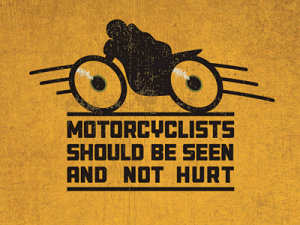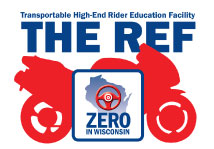In a four-seasons state like Wisconsin, May is the first month that motorcyclists become active after Winter storage and so it is Motorcycle Safety Awareness Month. As gas prices climb, motorcycles are increasingly being used for basic transportation as well as recreation. More than 500,000 Wisconsin residents have motorcycle licenses or permits and more than 300,000 motorcycles are registered in the state, according to the Wisconsin Department of Transportation and now is the time when the majority of them - Frozen Snot Rider particpantss and all-weather riders aside - are dusted off, tuned up,and taken out on the road.
 A few years ago I might have focused this post on safety for motorcyclists - and I will still remind bikers of the basics - but I have felt that bikers have gotten better and better at safety, and some facts are showing it such as that Motorcycle helmet use increased from 48% in 2005 to 67% in 2009.) Instead it seems more important to remind car drivers how to share the road with motorcycles. The Wisconsin Department of Transportation agrees.
A few years ago I might have focused this post on safety for motorcyclists - and I will still remind bikers of the basics - but I have felt that bikers have gotten better and better at safety, and some facts are showing it such as that Motorcycle helmet use increased from 48% in 2005 to 67% in 2009.) Instead it seems more important to remind car drivers how to share the road with motorcycles. The Wisconsin Department of Transportation agrees.
"During May, which is national Motorcycle Safety Awareness Month, we’re reminding motorists to share the road and watch for motorcycles, especially at intersections and while making turns and lane changes," says Greg Patzer, manager of the Wisconsin Motorcycle Safety Program, which is celebrating its 30 year anniversary.

The Motorcycle Safety Foundation®, the internationally recognized developer of the comprehensive, research-based, Rider Education and Training System (MSF RETS). Has safety tips for both riders & drivers as a pdf here. Their tips for drivers are:
 To assist riders in becoming more proficient, the Wisconsin Motorcycle Safety Program will hit the road again this year with its mobile training facility, called THE REF (Transportable High-End Rider Education Facility). THE REF promotes training for all riders as well as motorists' awareness of motorcycles on the road. To reach out to motorcycle riders and motorists around the state "THE REF goes to where the riders are," Patzer says. "Designed to be non-intrusive, while still offering the most critical of survival tips, THE REF encourages both riders and non-riders to learn more about sharing the road, crash avoidance, and awareness of road and traffic hazards." Last year, THE REF traveled throughout the state to motorcycle rallies, festivals and other events in more than 40 locations.
To assist riders in becoming more proficient, the Wisconsin Motorcycle Safety Program will hit the road again this year with its mobile training facility, called THE REF (Transportable High-End Rider Education Facility). THE REF promotes training for all riders as well as motorists' awareness of motorcycles on the road. To reach out to motorcycle riders and motorists around the state "THE REF goes to where the riders are," Patzer says. "Designed to be non-intrusive, while still offering the most critical of survival tips, THE REF encourages both riders and non-riders to learn more about sharing the road, crash avoidance, and awareness of road and traffic hazards." Last year, THE REF traveled throughout the state to motorcycle rallies, festivals and other events in more than 40 locations.
In addition to THE REF, the Wisconsin Motorcycle Safety Program has provided rider training for 30 years and has graduated more than 153,000 riders in that time. The Wisconsin Motorcycle Safety Program recently expanded its courses to offer comprehensive training for riders at all levels of experience from beginner to advanced. For information about rider training courses and locations, visit the WisDOT Web site.
Whether you are a Rider or a Driver (only one letter difference) as warm weather slowly makes its appearance in Wisconsin - and across the nation - open your eyes, be safe, and work together to make the roads a safe place for all. And don't forget to pay attention to bicycles as well. Together, the two-wheeled and four-wheeled users of our roads can reduce the injuries and fatalities and make them safe for all.
 A few years ago I might have focused this post on safety for motorcyclists - and I will still remind bikers of the basics - but I have felt that bikers have gotten better and better at safety, and some facts are showing it such as that Motorcycle helmet use increased from 48% in 2005 to 67% in 2009.) Instead it seems more important to remind car drivers how to share the road with motorcycles. The Wisconsin Department of Transportation agrees.
A few years ago I might have focused this post on safety for motorcyclists - and I will still remind bikers of the basics - but I have felt that bikers have gotten better and better at safety, and some facts are showing it such as that Motorcycle helmet use increased from 48% in 2005 to 67% in 2009.) Instead it seems more important to remind car drivers how to share the road with motorcycles. The Wisconsin Department of Transportation agrees."During May, which is national Motorcycle Safety Awareness Month, we’re reminding motorists to share the road and watch for motorcycles, especially at intersections and while making turns and lane changes," says Greg Patzer, manager of the Wisconsin Motorcycle Safety Program, which is celebrating its 30 year anniversary.

The Motorcycle Safety Foundation®, the internationally recognized developer of the comprehensive, research-based, Rider Education and Training System (MSF RETS). Has safety tips for both riders & drivers as a pdf here. Their tips for drivers are:
- Focus on Driving – Don’t be distracted. Never text or surf the Web while driving. Put down the cell phone or mobile device. Food, pets and even passengers can be bad distractions.
- Look for Motorcyclists – Motorcycles are smaller than other vehicles and are often harder to see. But motorcycles are out there and you should expect to see them and try to see them in the mix of traffic.
- Give Motorcyclists Enough Room – Keep a safe distance when following a motorcycle. Don't change lanes too close in front of a rider. Motorcyclists and their machines generally don’t just have fender-benders in collisions with cars.
- Use Your Turn Signals – Always signal your intentions. It’s for everyone's safety and it’s also the law.
- Keep it in the Car – Trash, including cigarette butts, should stay in the car, not thrown out where it could hit a motorcyclist. Road debris can kill a rider. Heavier items, especially, should be kept inside the car or truck or should be very well secured.
 To assist riders in becoming more proficient, the Wisconsin Motorcycle Safety Program will hit the road again this year with its mobile training facility, called THE REF (Transportable High-End Rider Education Facility). THE REF promotes training for all riders as well as motorists' awareness of motorcycles on the road. To reach out to motorcycle riders and motorists around the state "THE REF goes to where the riders are," Patzer says. "Designed to be non-intrusive, while still offering the most critical of survival tips, THE REF encourages both riders and non-riders to learn more about sharing the road, crash avoidance, and awareness of road and traffic hazards." Last year, THE REF traveled throughout the state to motorcycle rallies, festivals and other events in more than 40 locations.
To assist riders in becoming more proficient, the Wisconsin Motorcycle Safety Program will hit the road again this year with its mobile training facility, called THE REF (Transportable High-End Rider Education Facility). THE REF promotes training for all riders as well as motorists' awareness of motorcycles on the road. To reach out to motorcycle riders and motorists around the state "THE REF goes to where the riders are," Patzer says. "Designed to be non-intrusive, while still offering the most critical of survival tips, THE REF encourages both riders and non-riders to learn more about sharing the road, crash avoidance, and awareness of road and traffic hazards." Last year, THE REF traveled throughout the state to motorcycle rallies, festivals and other events in more than 40 locations.In addition to THE REF, the Wisconsin Motorcycle Safety Program has provided rider training for 30 years and has graduated more than 153,000 riders in that time. The Wisconsin Motorcycle Safety Program recently expanded its courses to offer comprehensive training for riders at all levels of experience from beginner to advanced. For information about rider training courses and locations, visit the WisDOT Web site.
Whether you are a Rider or a Driver (only one letter difference) as warm weather slowly makes its appearance in Wisconsin - and across the nation - open your eyes, be safe, and work together to make the roads a safe place for all. And don't forget to pay attention to bicycles as well. Together, the two-wheeled and four-wheeled users of our roads can reduce the injuries and fatalities and make them safe for all.

Comments
Post a Comment